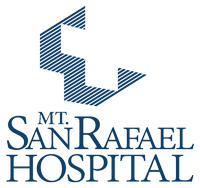Patient Rights and Responsibilities
Mt. San Rafael Hospital presents this policy statement to contribute to effective patient care and satisfaction.* The physicians and personnel in the hospital strive for excellence in service to all patients. They recognize the effort must include effective communication with the patient and their family.Our hospital affirms that people influence, and are influenced by, their environment, and this interaction can contribute to either health or illness. We have a concern for, and commitment to, the betterment of the physical, psychological, social, and spiritual needs of the whole person.
The Hospital's Responsibility To The Patient:
1. The hospital strives to give reasonable and respectful personal consideration to each patient. Individuals shall be accorded impartial access to treatment or accommodations that are available or medically indicated, regardless of race, creed, sex, or national origin.2. The hospital relies upon the attending physician to keep the patient informed of the their diagnosis, outcomes of care (including unanticipated outcomes), and his/her prospects of recovery in terms the patient can be expected to understand.
3. The patient has the right to participate in all decisions involving his/her care or treatment, including treatment for pain.
4. The patient has the right to know the names, professional status, and experience of the staff members providing their care or treatment.
5. The hospital's admissions procedures, statement of patient rights, information on advance directives, and information regarding the organ donor (Donor Alliance) program will be a part of the admission packet, given upon admission.
6. The patient has the right to refuse any drug, test, or treatment.
7. The patient has the right to care or treatment that is respectful, recognizes a person's dignity, and provides for personal privacy to the extent possible during the course of treatment.
8. The patient has the right to be informed, upon request and prior to the initiation of care or treatment that is non-emergent, of the charge(s) or estimated charge(s) for services that are routine, usual, or customary, based upon an average of patients admitted.
9. Patients have the right to give informed consent for all treatments and procedures. Informed consent shall include, but not be limited to, an explanation of the procedure in layman's terms and in a form of communication that the patient or patient's legal representative can understand. This includes risks and benefits and the probability of success, mortality risks, and serious side effects.
10. Patients have the right to be informed of the facility's grievance procedure.
11. The patient has the right to expect all communications and records pertaining to their care be treated as confidential.
12. The patient has the right to a reasonable response to requests for hospital services.
13. The patient has the right to assistance in discharge planning to aid in continuity of care.
14. The patient has the right to expect reasonable safety insofar as the hospital practices and environment are concerned.
Patient's Responsibilities to the Hospital:
Patients are expected to:1. Provide information about past illnesses, hospitalizations, medications, and other matters relating to the patient's health.
2. Cooperate with all hospital personnel and ask questions if directions and procedures are not understood.
3. Be considerate of other patients, assist in control of noise and number of visitors, and adhere to the hospital's no smoking policy.
4. Provide information necessary for insurance processing; however, the patient has the ultimate responsibility for paying all hospital bills.
5. Be respectful of the property of other persons and of the hospital.
6. Assist healthcare personnel in their efforts to return the patient to a healthy status.
7. Maintain the confidentiality of all other patients.
If, at any time, the patient believes any of these responsibilities have not or may not be fulfilled, he or she may call extension 1070. If the representative is unavailable, you will be contacted within 72 hours.
* Patient/parent/guardian/surrogate, as appropriate to the individual situation.






